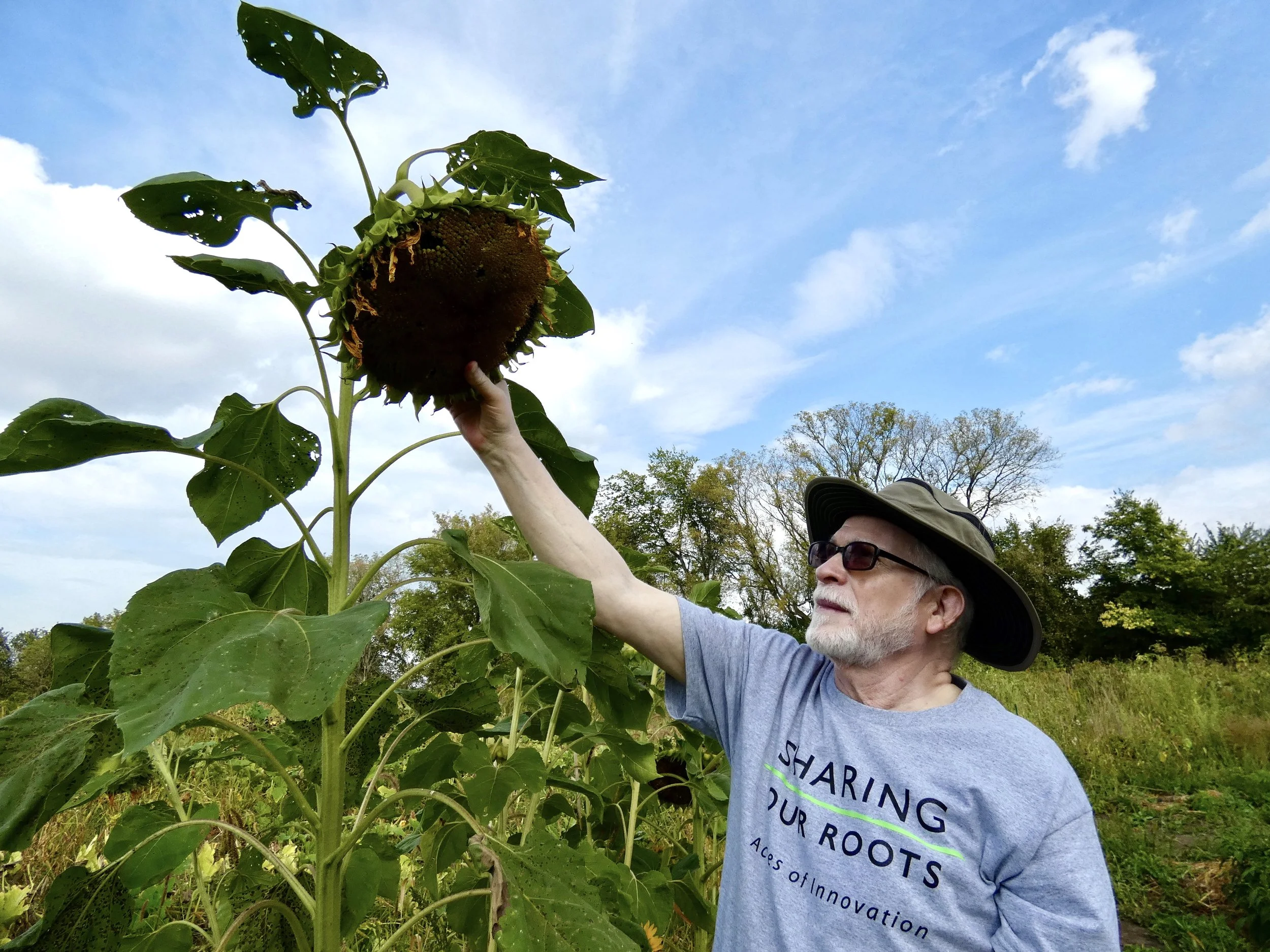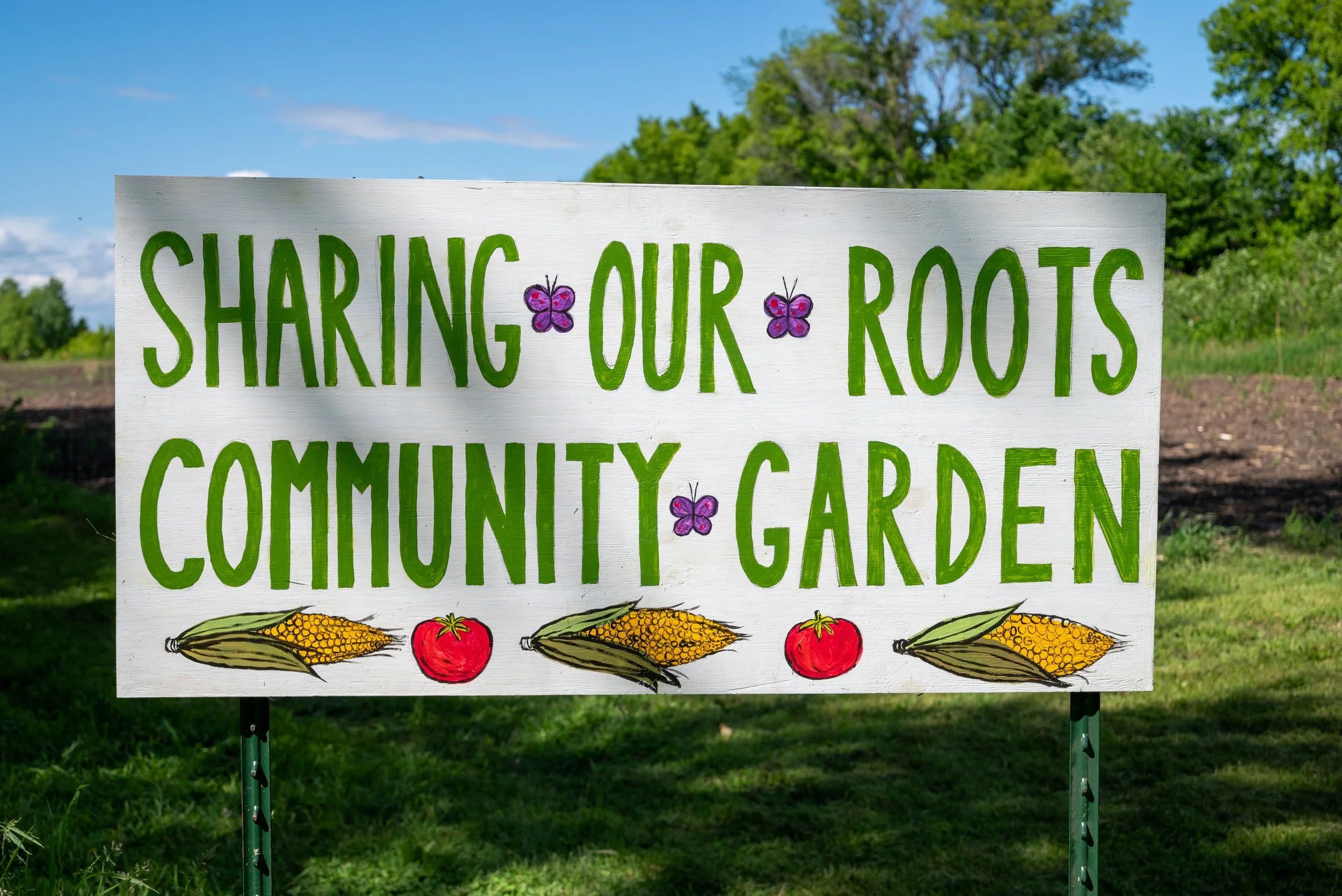Growing Connections
Community Gardens as Places of Nourishment
Araceli, a community gardener, cultivates with a hoe at the SOR community garden (May 2024)
As part of our mission of nourishing community, our Community Connectors initiative supports 154 local, low-income families grow healthy, fresh produce in 7 community gardens across Rice County, including a large garden at the Sharing Our Roots Farm.
Antonio with large sunflower in Sharing Our Roots Farm community garden (August 2023)
These gardens provide space to grow culturally-significant crops that may be difficult to find commercially, but land access is just the beginning. Community gardens also provide vibrant social spaces for neighbors, many of whom are recent immigrants. “Our gardeners come from different cultures, different countries, and speak different languages,” says Antonio Alba-Meraz, Community Connector Program Manager, “the gardens are a form of support, where cross-cultural relationships are the glue.”
Antonio knows the gardeners well - during the growing season, he visits each of our 7 community gardens once per week, staying an hour or two to answer gardeners’ questions about crops or pest management. These gardens are spread out all over Rice County: nestled in Faribault’s Cannon River Park, behind Northfield’s Greenvale Place Apartments, and around other homes and schools. At almost an acre, the largest garden can be seen to your right when entering the Sharing Our Roots Farm.
A muraled sign, recently completed, greets visitors to the SOR Community Garden (June 2024)
Sharing Our Roots employs four Community Connectors - Noemi Carreon, Wendy Romero, Elkanah Abobo, and Lina “Mama Tshutshu” Nyaronge. Each are leaders in their own community and together, support gardeners in English, Spanish, Swahili, and Kisii. Making sure that each gardener has the support they need starts with multilingual communication. Antonio says, “we try to know the gardeners the best we can, because they are not just numbers for us. They are people - 154 personalities in 4 different languages.”
Antonio and the Community Connectors provide tools, organic inputs (like seedlings), and advanced training sessions, which support gardeners in growing healthy, culturally-relevant produce for home-cooked family meals. Some gardeners have farming experience, some have never grown in a Minnesota climate, and others are growing their first-ever plants – fostering newfound connection to the soil, particularly for younger kids (family members are always invited to help out and hang out!) With plentiful hands-on practice and frequent technical training sessions, a few gardeners have even transitioned to become Commons Cohort farmers at the Sharing Our Roots Farm.
In terms of technical training, Antonio has extensive expertise to share: before moving to Minnesota, he spent many years as a field agronomist, traveling across Mexico. Nowadays, he knows the quirks of each garden, like which bugs to be particularly vigilant for, and he shares his time and expertise with all who ask. Antonio organizes regular technical trainings for gardeners - one of the most recent was teaching neighbors to use a portable small vacuum for beetles, rather than collecting them by hand. This helped gardeners learn how to control a pest, as well as how to distinguish an insect pest from a beneficial one. Using tools like the small vacuum also makes demanding gardening work accessible to more people, regardless of mobility.
The beetle vacuum
To all, the gardens offer vibrant social spaces for neighbors to connect across cultures. The opportunities to socialize over shared challenges and victories are frequent – many gardeners are immigrants new to Minnesota, primarily from Latin America or Kenya. Many gardeners face food insecurity or lack of affordable access to healthy fresh food, but all are passionate about the crops they grow. Socialization and cultural exchange often begins with discussions about plants: which varieties they are and how to grow and cook with them. Summer and fall can be quite the sight and conversation starter: you might see tomatillos, cabbage, maize, and traditional herbs on adjoining plots!
Antonio (left, tan hat) distributes free seedlings to community gardeners (May 2024)
All these secondary benefits seem magical, but one should never discount the practical importance of some extra fresh food: when their crops mature, families can go from relying on the food pantry to fill their food gap to donating excess fresh produce back. “I never thought I would donate food to the food shelf where I used to get food,” Antonio hears. Many report saving $300 in monthly food costs per month during peak season! This is nourishing the community – including expanding food access and sovereignty – in action.
Those gardeners, who after months of hard work get to keep (or share, sell, or donate!) 100% of the produce they grow, are the ones that truly help turn these plots of land into vibrant and healthy community gardens.
Metal sign at the Cannon River Park Community Garden in Faribault, MN (June 2024)
As a 501(c)3 non-profit, Sharing Our Roots relies on community donations to fund our work providing immigrant, BIPOC, and LGBTQ+ farmers with essential support. If you are able and inspired, please join us in our work to heal our lands and prepare emerging farmers by contributing a single-time or recurring donation.
You can donate directly to support programs like this that benefit our local farmers by selecting the “Community Connectors” drop-down on the donation portal. We are proud to be community-supported by donations of all amounts.
Thank you!







